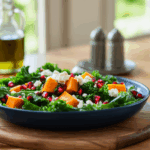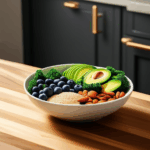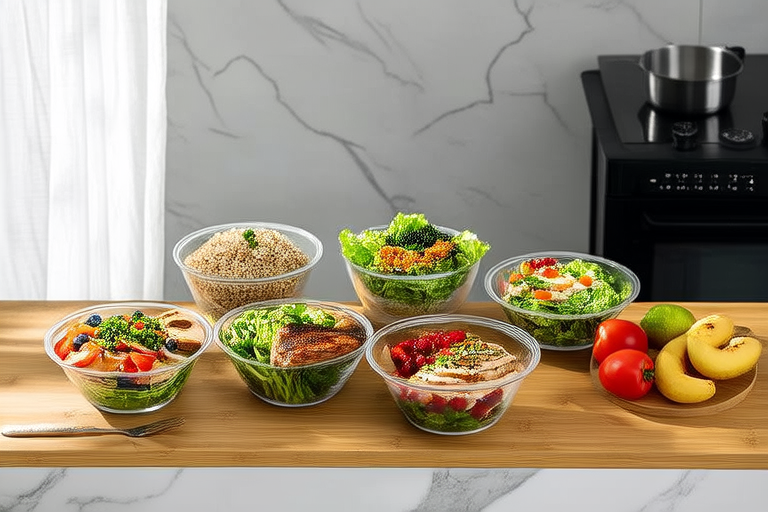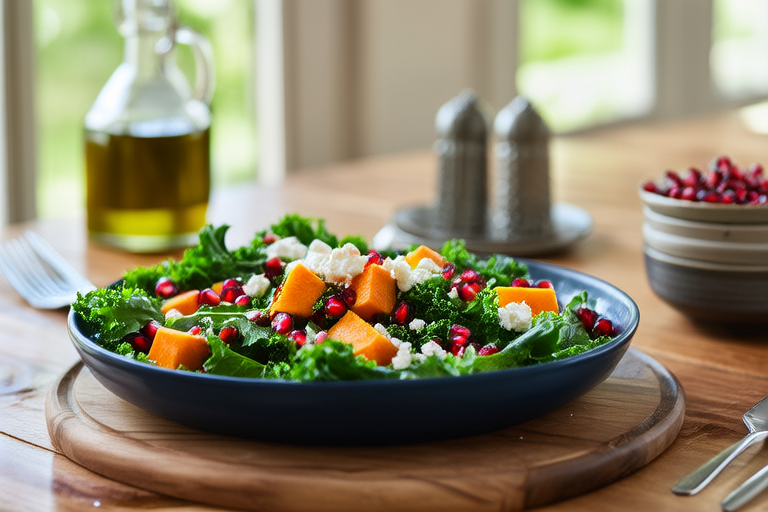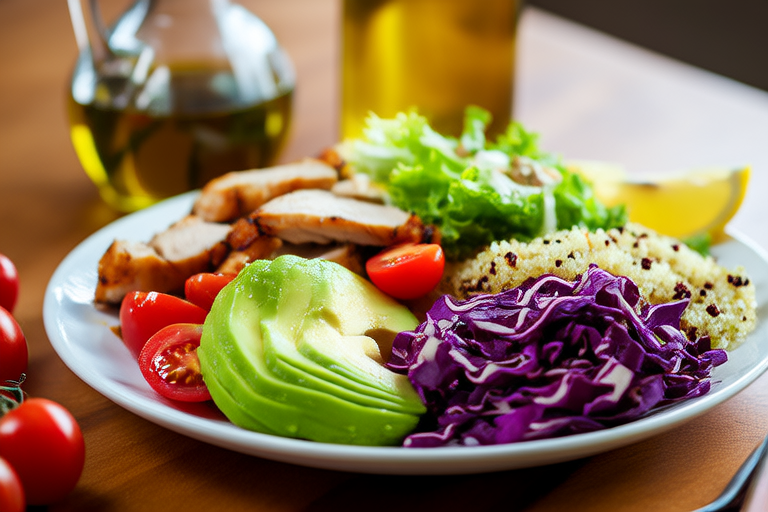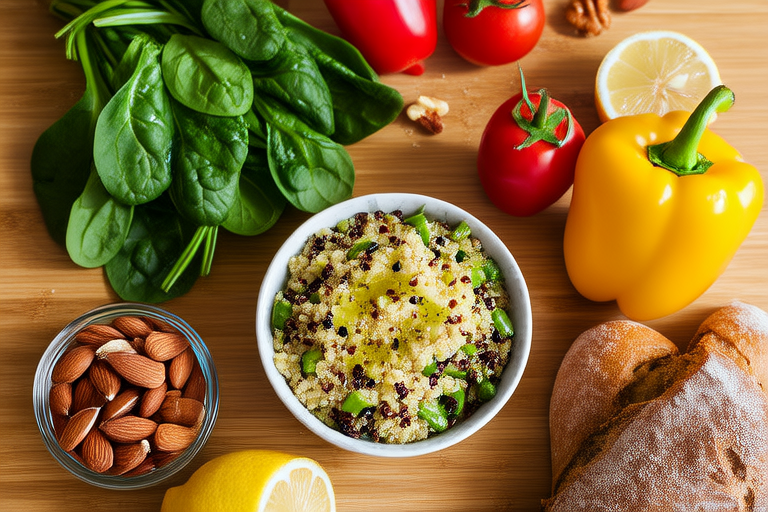The Importance of Healthy Eating for Overall Well-Being
Healthy eating is fundamental to leading a balanced and fulfilling life. It plays a crucial role in maintaining good health, preventing diseases, and enhancing mental well-being. A nutritious diet ensures that your body receives essential nutrients, vitamins, and minerals necessary for optimal functioning. By focusing on wholesome foods, you can improve your energy levels, support brain function, and boost your immune system. In this article, we will explore the significance of healthy eating and provide a variety of nutritious and delicious meal ideas across breakfast, lunch, dinner, and snacks. These recipes emphasize balance, simplicity, and accessibility, making it easier for you to incorporate them into your daily routine.
Breakfast: Starting Your Day Right
A healthy breakfast sets the tone for the day ahead. It provides the necessary fuel to kickstart your metabolism and maintain steady energy levels throughout the morning. Here are some nutritious and delicious breakfast options:
1. Greek Yogurt Parfait
- Ingredients: 1 cup Greek yogurt, 1/2 cup mixed berries (strawberries, blueberries, raspberries), 2 tablespoons granola, 1 tablespoon honey
- Preparation: Layer the Greek yogurt, mixed berries, and granola in a glass or bowl. Drizzle with honey before serving.
- Nutritional Benefits: Greek yogurt is rich in protein and probiotics, which promote digestive health. Berries are packed with antioxidants and fiber, while granola adds crunch and whole grains.
2. Avocado Toast
- Ingredients: 1 slice whole grain bread, 1/4 avocado, 1 teaspoon olive oil, salt, pepper, red pepper flakes (optional)
- Preparation: Toast the bread. Mash the avocado and spread it on the toast. Drizzle with olive oil and season with salt, pepper, and red pepper flakes.
- Nutritional Benefits: Whole grain bread provides complex carbohydrates for sustained energy. Avocado offers healthy fats, fiber, and potassium, which help regulate blood pressure.
3. Oatmeal with Almond Butter and Banana
- Ingredients: 1/2 cup rolled oats, 1 cup water or milk, 1 tablespoon almond butter, 1 banana, 1 teaspoon cinnamon
- Preparation: Cook the oats according to package instructions. Top with almond butter, sliced banana, and sprinkle with cinnamon.
- Nutritional Benefits: Rolled oats are high in fiber, which promotes digestion and satiety. Almond butter provides healthy fats and protein, while bananas offer potassium and vitamin B6.
Lunch: Fueling Your Afternoon
A balanced lunch helps you stay focused and productive during the afternoon. Opt for meals that combine lean proteins, healthy fats, and complex carbohydrates to keep you energized. Here are some nutritious and delicious lunch ideas:
1. Quinoa Salad with Grilled Chicken
- Ingredients: 1 cup cooked quinoa, 1/2 cup grilled chicken breast, 1/2 cup cherry tomatoes, 1/4 cup cucumber, 1/4 cup feta cheese, 2 tablespoons olive oil, lemon juice, salt, pepper
- Preparation: Combine all ingredients in a bowl. Toss with olive oil, lemon juice, salt, and pepper.
- Nutritional Benefits: Quinoa is a complete protein source, providing all nine essential amino acids. Chicken breast is low in fat and high in protein, while tomatoes and cucumbers offer hydration and vitamins.
2. Lentil Soup
- Ingredients: 1 cup dried lentils, 4 cups vegetable broth, 1 onion, 2 carrots, 2 celery stalks, garlic, salt, pepper, herbs (thyme, rosemary, bay leaf)
- Preparation: Sauté onions, carrots, and celery in a pot. Add garlic, herbs, and lentils. Pour in vegetable broth and simmer until lentils are tender.
- Nutritional Benefits: Lentils are an excellent source of plant-based protein and fiber, promoting digestive health and satiety. They also provide iron and folate.
3. Turkey Wrap with Hummus
- Ingredients: 1 whole wheat wrap, 3 slices turkey breast, 2 tablespoons hummus, 1/4 cup spinach, 1/4 cup shredded carrots, 1/4 avocado
- Preparation: Spread hummus on the wrap. Layer with turkey, spinach, carrots, and avocado. Roll up the wrap tightly.
- Nutritional Benefits: Whole wheat wraps provide whole grains and fiber. Turkey breast is a lean protein source, while hummus adds healthy fats and fiber from chickpeas.
Dinner: Nourishing Your Body
Dinner should be a satisfying and nourishing meal that supports your body’s recovery and repair processes. Focus on incorporating a variety of nutrient-dense ingredients to ensure a well-rounded meal. Here are some nutritious and delicious dinner ideas:
1. Baked Salmon with Asparagus
- Ingredients: 1 salmon fillet, 1 bunch asparagus, 1 tablespoon olive oil, lemon juice, salt, pepper, dill
- Preparation: Preheat oven to 400°F (200°C). Place salmon on a baking sheet lined with parchment paper. Drizzle with olive oil and season with lemon juice, salt, pepper, and dill. Roast for 12-15 minutes. Serve with roasted asparagus.
- Nutritional Benefits: Salmon is rich in omega-3 fatty acids, which reduce inflammation and support heart health. Asparagus provides fiber, vitamins, and antioxidants.
2. Stir-Fried Tofu with Vegetables
- Ingredients: 1 block firm tofu, 1 bell pepper, 1 zucchini, 1 carrot, 1 onion, 2 tablespoons soy sauce, 1 tablespoon sesame oil, garlic, ginger, green onions
- Preparation: Press tofu to remove excess moisture. Slice tofu and vegetables. Heat sesame oil in a pan. Add garlic, ginger, and tofu. Stir-fry until golden. Add vegetables and soy sauce. Cook until tender.
- Nutritional Benefits: Tofu is a versatile plant-based protein source. Bell peppers, zucchini, and carrots offer vitamins, minerals, and antioxidants.
3. Chicken and Vegetable Skillet
- Ingredients: 1 boneless, skinless chicken breast, 1 bell pepper, 1 zucchini, 1 onion, 1/2 cup cherry tomatoes, 1 tablespoon olive oil, garlic, thyme, salt, pepper
- Preparation: Heat olive oil in a skillet. Add garlic and chicken breast. Cook until browned. Remove chicken and set aside. Add vegetables to the skillet and sauté. Return chicken to the skillet. Season with thyme, salt, and pepper. Cover and cook until chicken is fully cooked.
- Nutritional Benefits: Chicken breast is a lean protein source. Bell peppers, zucchini, and tomatoes provide vitamins, minerals, and antioxidants.
Snacks: Keeping You Satisfied Between Meals
Healthy snacks can help bridge the gap between meals and prevent overeating. Choose snacks that are nutrient-dense and satisfying to keep you energized throughout the day. Here are some nutritious and delicious snack ideas:
1. Apple Slices with Peanut Butter
- Ingredients: 1 apple, 2 tablespoons peanut butter
- Preparation: Slice the apple. Spread peanut butter on the slices.
- Nutritional Benefits: Apples are rich in fiber and antioxidants. Peanut butter provides healthy fats and protein.
2. Carrot Sticks with Hummus
- Ingredients: 1 bunch baby carrots, 2 tablespoons hummus
- Preparation: Serve carrot sticks with hummus for dipping.
- Nutritional Benefits: Carrots are packed with beta-carotene, which converts to vitamin A in the body. Hummus adds healthy fats and fiber.
3. Mixed Nuts and Dried Fruits
- Ingredients: 1/4 cup mixed nuts, 2 tablespoons dried fruits (cranberries, raisins, apricots)
- Preparation: Mix nuts and dried fruits in a small container.
- Nutritional Benefits: Nuts are a great source of healthy fats, protein, and fiber. Dried fruits provide natural sugars and antioxidants.
Maintaining a Healthy Diet in Daily Life
Incorporating these nutritious and delicious meals into your routine can significantly improve your overall well-being. To maintain a healthy diet, focus on balance, simplicity, and accessibility. Here are some practical tips:
- Plan Ahead: Spend time each week planning your meals and snacks. This helps ensure you have the necessary ingredients on hand and reduces the likelihood of resorting to less healthy options.
- Shop Smart: Make a grocery list before heading to the store. Stick to whole, unprocessed foods whenever possible. Avoid aisles filled with processed snacks and sugary beverages.
- Practice Portion Control: Be mindful of portion sizes to avoid overeating. Use smaller plates and bowls to help control portions.
- Stay Hydrated: Drink plenty of water throughout the day. Aim for at least eight glasses per day. Herbal teas and infused waters can add variety and flavor.
- Listen to Your Body: Pay attention to hunger and fullness cues. Eat when you’re hungry and stop when you’re satisfied. Avoid emotional eating by finding alternative ways to cope with stress.
- Be Patient: Developing healthy eating habits takes time. Focus on progress rather than perfection. Celebrate small victories along the way.
By prioritizing healthy eating, you can enhance your physical and mental well-being. Incorporate these nutritious and delicious meals into your daily routine and enjoy the benefits of a balanced diet. Remember, consistency is key, so stay committed to your goals and make gradual changes that work for you. With time and effort, you’ll find yourself feeling healthier, more energetic, and ready to take on whatever challenges come your way.



